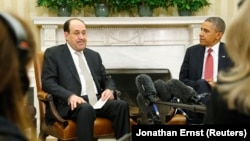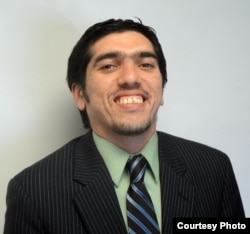WASHINGTON —
Nearly two years ago, the U.S. pulled its last troops out of Iraq. Since then Iraqis have seen the dramatic resurgence of al-Qaida in Iraq (AQI) and unprecedented sectarian violence that left more than 1,000 dead last month alone.
Earlier this month, Iraqi Prime Minister Nouri al-Maliki visited the White House and pressed President Barack Obama for increased military and intelligence assistance he says is necessary to combat the forces threatening his government. He and Obama also addressed regional security concerns—including the conflict in Syria and the threat of weapons of mass destruction.
The request for assistance represents a dramatic turnaround for Maliki, who two years ago rejected a continued U.S. military presence in Iraq. Critics charge that since then, he has exacerbated sectarian tensions in Iraq and forged a close relationship with Iran, thus raising fears of Iranian ascendancy in the region.
Ahmed Ali, senior Iraq research analyst and Iraq Team Leader at the Washington-based Institute for the Study of War says he believes the Iraqi government is ill-equipped to stop Al Qaeda, which has been carrying out regular car bombings and other attacks on pro-government citizens.
“The violence is partly due to the rising capabilities of AQI and is also partly due to the discontent that the Iraqi Sunnis feel,” Ali said. “The Iraqi Sunnis do feel marginalized by the Baghdad government. They also perceive the Baghdad government to be sectarian. That does not mean that all Iraqi Sunnis are carrying arms and fighting against the central government. What it does mean, however, is that AQI is in a position to win the sympathy of the population.”
Maliki wants advanced weaponry
The United States has sold and delivered more than $14 billion in equipment, services and training to Iraqi military and security forces since 2005, including military transport aircraft, reconnaissance helicopters, patrol boats to guard oil platforms and a surface-to-air missile battery.
Last year, Iraq signed a new contract to buy 18 F-16 fighter jets from the United States to add to the 18 it had already purchased. Those are slated to be delivered next year.
In addition, last September, the United States also gave Iraq surveillance balloons, communication towers and cameras to aid in its security efforts.
But Maliki wants more and is urging the United States to sell him advanced weapons systems. Though details of the talks have not yet been made, a UPI report says Iraq wants to purchase Lockheed Martin AGM114 Hellfire air-to-surface missiles and the Boeing AH-64A/D Apache gunships to carry them.
Following his meeting with the prime minister, Obama told reporters that the U.S. wants to do what it can to help bring peace and security to Iraq. He also said he was encouraged by Maliki’s past efforts to work toward giving Iraq’s Sunni, Shia and Kurd communities a more equal voice in government. And he said he urged Iraq to pass a long-stalled election law, so that Iraqis could settle their differences politically, not violently.
However, it is not yet clear what, if any, promises were made or, more importantly, whether the U.S. Congress would approve any such arms deal.
Worries over how weapons could be used
Juan Cole, director of the Center for the Middle East and North African Studies at the University of Michigan, says the U.S. clearly has an obligation to try to make things “right” in Iraq. But he has some big concerns about Baghdad getting ahold of more advanced weapons.
“His [Maliki's] constituency is getting blown up every other day, and frankly, I’m puzzled by this,” Cole said. “The Iraqi army got itself together to the point where it could stand and fight Muqtada al-Sadr’s Mahdi army. So why can’t they counter terrorism?”
He also worries about how these weapons might be used.
“Maliki seems to have difficulty distinguishing between the real insurgency that he faces and the political demands of the general Sunni population,” Cole said, pointing to Iraqi military raid on a Sunni protester camp in Hawija last April, in which 50 people died and 180 were wounded.
Before the United States gives any aid or weaponry to Iraq, Cole says Maliki needs to offer strong assurances that they would be used only in fighting AQI--not political opponents.
Senators urge political change
Meanwhile, U.S. Senator John McCain and five members of the Senate Armed Services and Foreign Relations panels recently sent a letter to Obama expressing their concerns about Maliki’s request. They aren’t happy with Iran’s growing influence over Iraq and its use of Iraqi airspace to send military support to the Syrian regime. While they support further intelligence sharing, they would set certain conditions before approving further arms sales.
They are calling on Maliki to hold free and fair elections and to also resolve disputes with Kurds over territory and oil revenues before he receives the U.S. support he says he needs to secure Iraq’s future.
Earlier this month, Iraqi Prime Minister Nouri al-Maliki visited the White House and pressed President Barack Obama for increased military and intelligence assistance he says is necessary to combat the forces threatening his government. He and Obama also addressed regional security concerns—including the conflict in Syria and the threat of weapons of mass destruction.
The request for assistance represents a dramatic turnaround for Maliki, who two years ago rejected a continued U.S. military presence in Iraq. Critics charge that since then, he has exacerbated sectarian tensions in Iraq and forged a close relationship with Iran, thus raising fears of Iranian ascendancy in the region.
Ahmed Ali, senior Iraq research analyst and Iraq Team Leader at the Washington-based Institute for the Study of War says he believes the Iraqi government is ill-equipped to stop Al Qaeda, which has been carrying out regular car bombings and other attacks on pro-government citizens.
“The violence is partly due to the rising capabilities of AQI and is also partly due to the discontent that the Iraqi Sunnis feel,” Ali said. “The Iraqi Sunnis do feel marginalized by the Baghdad government. They also perceive the Baghdad government to be sectarian. That does not mean that all Iraqi Sunnis are carrying arms and fighting against the central government. What it does mean, however, is that AQI is in a position to win the sympathy of the population.”
Maliki wants advanced weaponry
The United States has sold and delivered more than $14 billion in equipment, services and training to Iraqi military and security forces since 2005, including military transport aircraft, reconnaissance helicopters, patrol boats to guard oil platforms and a surface-to-air missile battery.
Last year, Iraq signed a new contract to buy 18 F-16 fighter jets from the United States to add to the 18 it had already purchased. Those are slated to be delivered next year.
In addition, last September, the United States also gave Iraq surveillance balloons, communication towers and cameras to aid in its security efforts.
But Maliki wants more and is urging the United States to sell him advanced weapons systems. Though details of the talks have not yet been made, a UPI report says Iraq wants to purchase Lockheed Martin AGM114 Hellfire air-to-surface missiles and the Boeing AH-64A/D Apache gunships to carry them.
Following his meeting with the prime minister, Obama told reporters that the U.S. wants to do what it can to help bring peace and security to Iraq. He also said he was encouraged by Maliki’s past efforts to work toward giving Iraq’s Sunni, Shia and Kurd communities a more equal voice in government. And he said he urged Iraq to pass a long-stalled election law, so that Iraqis could settle their differences politically, not violently.
However, it is not yet clear what, if any, promises were made or, more importantly, whether the U.S. Congress would approve any such arms deal.
Worries over how weapons could be used
Juan Cole, director of the Center for the Middle East and North African Studies at the University of Michigan, says the U.S. clearly has an obligation to try to make things “right” in Iraq. But he has some big concerns about Baghdad getting ahold of more advanced weapons.
“His [Maliki's] constituency is getting blown up every other day, and frankly, I’m puzzled by this,” Cole said. “The Iraqi army got itself together to the point where it could stand and fight Muqtada al-Sadr’s Mahdi army. So why can’t they counter terrorism?”
He also worries about how these weapons might be used.
“Maliki seems to have difficulty distinguishing between the real insurgency that he faces and the political demands of the general Sunni population,” Cole said, pointing to Iraqi military raid on a Sunni protester camp in Hawija last April, in which 50 people died and 180 were wounded.
Before the United States gives any aid or weaponry to Iraq, Cole says Maliki needs to offer strong assurances that they would be used only in fighting AQI--not political opponents.
Senators urge political change
Meanwhile, U.S. Senator John McCain and five members of the Senate Armed Services and Foreign Relations panels recently sent a letter to Obama expressing their concerns about Maliki’s request. They aren’t happy with Iran’s growing influence over Iraq and its use of Iraqi airspace to send military support to the Syrian regime. While they support further intelligence sharing, they would set certain conditions before approving further arms sales.
They are calling on Maliki to hold free and fair elections and to also resolve disputes with Kurds over territory and oil revenues before he receives the U.S. support he says he needs to secure Iraq’s future.






